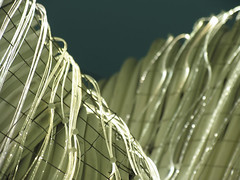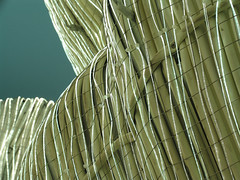I've spent more time than ever in churches in recent months in preparation for our daughter's confirmation last weekend. It's nice - but ergonomically very uncomfortable - to sit there for an hour or so, singing the old psalms, listening to the amazing scriptures, hearing the priest preaching...
I am not babtized. I don't really feel a member, there's so much about the institution of the church that I have a hard time with. (E.g.the insistence on one, well defined God, the tendency to use God's forgiveness as an excuse for independent thinking and responsibility...)
Never the less, you cannot but marvel at the wisdom of the words of Paul in the first corinthian letter:
If I speak in the tongues of men and of angels, but have not love, I am only a resounding gong or a clanging cymbal. If I have the gift of prophecy and can fathom all mysteries and all knowledge, and if I have a faith that can move mountains, but have not love, I am nothing. If I give all I possess to the poor and surrender my body to the flames, but have not love, I gain nothing.
Love is patient, love is kind. It does not envy, it does not boast, it is not proud. It is not rude, it is not selfseeking, it is not easily angered, it keeps no record of wrongs. Love does not delight in evil but rejoices with the truth. It always protects, always trusts, always hopes, always perseveres.
Love never fails. But where there are prophecies, they will cease; where there are tongues, they will be stilled; where there is knowledge, it will pass away. For we know in part and we prophesy in part, but when perfection comes, the imperfect disappears. When I was a child, I talked like a child, I thought like a child, I reasoned like a child. When I became a man, I put childish ways behind me. Now we see but a poor reflection as in a mirror; then we shall see face to face. Now I know in part; then I shall know fully, even as I am fully known.
And now these three remain: faith, hope and love. But the greatest of these is love.
Tuesday, April 26, 2005
Wednesday, April 20, 2005
Steward Brand on environmental heresies
Steward Brand has changed my thinking fundamentally on several occasions. He has a knack for seeing major paradigm shifts just before they happen. So I listen when he raises his voice. This months Technology review features his article on environmental Hieresies. He argues that over the coming decade the environmental movement will completely reverse it's position on four issues that are currently no-no's: population growth, urbanization, genetically engineered organisms, and nuclear power.
For me, the most controversial of those is nuclear power. I don't feel ready for nukes just yet.
I guess what it all comes down to is whether you believe that quantative growth is the only possible way forward. Should we charge ahead, fix the problems that may arise by applying ever more advanced technology - or should we back off a little, adopt an attitude of more with less, focusing on ressource effeciency. Of course the answer is to combine the two. Use the technology and science in a way that's in accord with the workings of the biosphere. Sounds easy. So: does nuclear power fit?
For me, the most controversial of those is nuclear power. I don't feel ready for nukes just yet.
I guess what it all comes down to is whether you believe that quantative growth is the only possible way forward. Should we charge ahead, fix the problems that may arise by applying ever more advanced technology - or should we back off a little, adopt an attitude of more with less, focusing on ressource effeciency. Of course the answer is to combine the two. Use the technology and science in a way that's in accord with the workings of the biosphere. Sounds easy. So: does nuclear power fit?
Saturday, April 16, 2005
Where To Find Great Free Photographs And Visuals For Your Own Online Articles
Where To Find Great Free Photographs And Visuals For Your Own Online Articles - Robin Good's Latest News
This is an amazing collection of links to places online for free photos. And in general, a quite impressive site with information on publishing.
This is an amazing collection of links to places online for free photos. And in general, a quite impressive site with information on publishing.
The glacier simulator - still unfrozen

IMG_7397_800

IMG_7432_re_800

IMG_7460_800

IMG_7436_800
Things are starting to take shape in the park. We're opening may 5th, so speed is building up by the hour. Very intense period, good fun too, luckily.
We're installing a simulator of a glacier crevasse. It's a giant freezer that you pass through on your way to a room with a vibrating floor and a video display about calving glaciers. The cooling tubes are interwoven with fiberoptic cable. The cooling has not been turned on yet, so I'm looking forward to see it covered with ice. Any day now.
Sunday, April 10, 2005
The price of gasoline
Just read that the average price of a gallon of regular gasolin in the US is $2.22. At my local gas station here in Denmark, 1 liter of regular gasoline is 9,34 Danish kroner.
So let’s do the math, assuming that the exchange rate between dollars and Danish kroner is 5,8 and that 1 gallon equals 3.78 liters:
Translated into Danish kroners, the american gasolin price is 3.41 Danish Kroner for one liter of gasoline.
Translated into dollars, the Danish price of gasoline is $ 1.61 pr. Liter, or $ 6.09 pr. Gallon.
So let’s do the math, assuming that the exchange rate between dollars and Danish kroner is 5,8 and that 1 gallon equals 3.78 liters:
Translated into Danish kroners, the american gasolin price is 3.41 Danish Kroner for one liter of gasoline.
Translated into dollars, the Danish price of gasoline is $ 1.61 pr. Liter, or $ 6.09 pr. Gallon.
The myth of our perfection
At times it seems to me that a lot of our closest friends are living very turbulent lives.So many of the people I love are really in very fragile or messy circumstances (of course they may think I am in messy circumstances – maybe I am, despite my feeling almost obscenely normal).
We get ill, we forget, we have bad habits, dark sides of our personality. We have weak spots, we have screwed up relationships, ghost in our past.
My point is: We’re all weird in some ways, we live messy lives, we all have aspects of our life that are on, or beyond, the edge of what’s generally, officially acceptable.
But we also live in this collective myth of human perfection. As professionals, in public, and certainly in the media, we carefully remove all signs of imperfection and weakness. Enough of this, and you end up believing perfection is normal and mess is the exception.
Some of my friends once had their home featured in Arcitectural Digest. I could barely recognize the place: dressed up with furniture brought in for the occasion, rooms with absolutely no mess, except for a few pittoresque touches of humanness.
A reportage of maybe 15 photos, each representing a 1/125 second slice of reality. I happen to know that there haven’t been many 1/125 seconds since then in which the place has looked like what was presented in the magazine.
The facade blocks the view. Maybe we can make our life look orderly for long enough to make a good impression – but we know that the cupboards are bursting with hidden mess – the real stuff.
We get ill, we forget, we have bad habits, dark sides of our personality. We have weak spots, we have screwed up relationships, ghost in our past.
My point is: We’re all weird in some ways, we live messy lives, we all have aspects of our life that are on, or beyond, the edge of what’s generally, officially acceptable.
But we also live in this collective myth of human perfection. As professionals, in public, and certainly in the media, we carefully remove all signs of imperfection and weakness. Enough of this, and you end up believing perfection is normal and mess is the exception.
Some of my friends once had their home featured in Arcitectural Digest. I could barely recognize the place: dressed up with furniture brought in for the occasion, rooms with absolutely no mess, except for a few pittoresque touches of humanness.
A reportage of maybe 15 photos, each representing a 1/125 second slice of reality. I happen to know that there haven’t been many 1/125 seconds since then in which the place has looked like what was presented in the magazine.
The facade blocks the view. Maybe we can make our life look orderly for long enough to make a good impression – but we know that the cupboards are bursting with hidden mess – the real stuff.
Saturday, April 09, 2005
If you need a hotel in Århus
I stay in a lot of hotels, but very rarely do they leave much of an impression, and if so it's usually for the things that don't work - like plumbing in British hotels. A few days ago I stayed at Hotel Guldsmeden in Århus, Denmark. It is used by the school of journalism for a lot of their guests and students.
This may sound a bit dramatic, but the place was a reminder of the importance of insisting on quality, beauty and kindness.
It's a three star hotel, not a high end place. The room I slept in was 995 kr, but they have cheaper rooms as well.
It had beautiful furniture, original art on the walls, it was absolutely clean, and there was free wifi access (such a positive gesture). Breakfeast was the best I've had in quite a while.
Anyway, it's hard to describe, but what made the difference was the sense that this was a very personal project - a project with the clear aim of making the stay nice for the guests.
(They have a new hotel in Copenhagen also. I'll have to try that out)
Now you know.
This may sound a bit dramatic, but the place was a reminder of the importance of insisting on quality, beauty and kindness.
It's a three star hotel, not a high end place. The room I slept in was 995 kr, but they have cheaper rooms as well.
It had beautiful furniture, original art on the walls, it was absolutely clean, and there was free wifi access (such a positive gesture). Breakfeast was the best I've had in quite a while.
Anyway, it's hard to describe, but what made the difference was the sense that this was a very personal project - a project with the clear aim of making the stay nice for the guests.
(They have a new hotel in Copenhagen also. I'll have to try that out)
Now you know.
From a binary to a probabilistic paradigm
Heard a nice phrase in a speech by Clay shirky: We’re moving from a binary to a probabilistic way of doing things.
Indeed! As I see it, this is one of the main charateristics of the paradigm shift I’ve been trying to describe for years.
Clay Shirky used it to describe how our way of classifying information is changing as we move from physical to digital libraries. We no longer have to stick rigorously to official categories. Neither do have to make sure that each subject only belongs to one higher level category. In stead we can tag information in any number of ways, and let anyone participate in creating the tags. In fact the variance in how people classify a given document may only add to our understanding of it.
But moving from a binary to a probabilistic worldview applies much broader. It’s a general way of understanding reality that we have to learn.
We’ve been used to thinking that answers were certain, that truths were absolute, that conclusions were clear, that categories and facts were solid and objective.
But the new paradigm suggests that this is actually the exception. Most of the answers these days are not binary – a clear yes or no. Is it a good idea to invade Iraq, Is nuclear power bad, are we making progress? For the majority of questions you can only answer with a certain probability, and given certain contexts. One result of the spread of information is that we realize, that there are many truths and noone really knows very much for certain.
If I got really philosophical I would point out how this world view is represented even in basic physics – for instance, that you cannot know exactly where an electron is. You can only tell with a certain probability that it is at a particular location.
Indeed! As I see it, this is one of the main charateristics of the paradigm shift I’ve been trying to describe for years.
Clay Shirky used it to describe how our way of classifying information is changing as we move from physical to digital libraries. We no longer have to stick rigorously to official categories. Neither do have to make sure that each subject only belongs to one higher level category. In stead we can tag information in any number of ways, and let anyone participate in creating the tags. In fact the variance in how people classify a given document may only add to our understanding of it.
But moving from a binary to a probabilistic worldview applies much broader. It’s a general way of understanding reality that we have to learn.
We’ve been used to thinking that answers were certain, that truths were absolute, that conclusions were clear, that categories and facts were solid and objective.
But the new paradigm suggests that this is actually the exception. Most of the answers these days are not binary – a clear yes or no. Is it a good idea to invade Iraq, Is nuclear power bad, are we making progress? For the majority of questions you can only answer with a certain probability, and given certain contexts. One result of the spread of information is that we realize, that there are many truths and noone really knows very much for certain.
If I got really philosophical I would point out how this world view is represented even in basic physics – for instance, that you cannot know exactly where an electron is. You can only tell with a certain probability that it is at a particular location.
Saturday, April 02, 2005
Culture is a process
Culture is a process. It’s continually evolving. Culture is not static. Culture is interaction, innovation, culture comes to life by being used and developed.
It’s obvious. Never the less there’s a very strong tendency to think that culture is motionless, something you should protect and never change. So keep away foreign influence, chant the old truths lest our precious national culture should become corrupted.
It’s obvious. Never the less there’s a very strong tendency to think that culture is motionless, something you should protect and never change. So keep away foreign influence, chant the old truths lest our precious national culture should become corrupted.
What’s on your i pod? You are.
It strikes me how much our devices are becoming mirrors of our selves. A look at the playlists and photos of an ipod is amazingly revealing of the owners personality. PC’s of course tell it all. Our lives flow through them in almost every aspect. It’s almost scary when you think about how much about you is in your computer. The police knows of course,”computer forensics” has become an important discipline.
Subscribe to:
Comments (Atom)